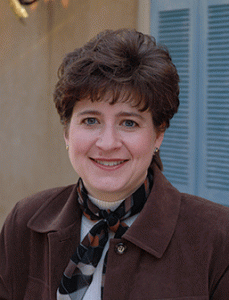Navigating New Waters: The Nurse’s Role
Guest post by Michele R. McCorkle, RN, MSN
Executive Director, Oncology Nursing Society
Cancer changes a person’s healthcare needs forever. “Normal” takes on a whole new meaning every day. Cancer is one of the few diseases for which treatment makes you sicker before you are well. I learned this early on in my oncology nursing career back in the 1980s. I have been in cancer care for almost 30 years now, and it is amazing to see the scientific advances in the treatment of cancer and the management of symptoms and side effects. Treatments have changed drastically from the days when I mixed intravenous chemotherapy as the evening charge nurse, and patients stayed in the hospital to receive it over many days. Now, many chemotherapy drugs are available in oral form and patients take them themselves, at home. These oral drugs target specific parts of cancer cells and, as a result, often have fewer whole-body side effects.
Despite the scientific advances, the patient’s and family’s side of the cancer equation isn’t any easier—in fact, it is more challenging and complex than ever before. Newer drugs, as good as they are, do not help treat psychosocial obstacles that have a major impact on one’s cancer care experience. Fear, living alone, changes in roles at home and at work, ethnicity, transportation, and education as it relates to prevention, nutrition, and medication adherence all contribute to a unique set of barriers confronting the patient and family with cancer. In addition, patients and families now are faced with a new side effect of cancer treatment—financial toxicity.
As oncology healthcare providers, we think we are pretty good at patient-centered care. However, a National Academy of Medicine report published in 2013 says that we “may not” be good at this. Per the report, our cancer care often is not as patient-centered, accessible, coordinated, or evidence-based as it could be.
The report identifies improvements in assuring a well-trained workforce that uses research-based evidence to make care decisions, a greater level of patient engagement in their care, assurance of quality tracking, and improving access to affordable care as priority issues. Those with advanced cancer need end-of-life care that is consistent with their priorities and values. Identification of palliative care services and psychosocial support provided by a diverse, interprofessional team assures a higher quality of care.
How do Oncology Nurses and the Oncology Nurse Navigators Help?
These mandates, then, require a coordinated effort, and point to the unique skills of nurses to help patients navigate the care continuum. Oncology nurses are fundamental to the success of new care delivery models. Oncology nurses are uniquely attuned to the holistic nature of cancer care, and fulfill a translational role of their own, by bridging the patient and family’s goals of care with those recommended by the interprofessional team. The oncology nurse functions as a patient care coordinator and collaborates with other healthcare team members to provide high-quality interdisciplinary care, fulfilling a substantive role in decision making as equal administrative and practice partners in the planning and implementation of cancer care services. The nurse acts as a patient navigator and advocates for and assists patients and families in gaining information, ensuring informed consent for treatment decisions, and promoting maximum autonomy.
Care coordination is a core competency of the oncology nurse navigator (ONN) role. The ONN is a professional RN with oncology-specific clinical knowledge who offers individualized assistance to patients, families, and caregivers to help overcome healthcare system barriers. The oncology nurse is the healthcare provider that patients with cancer and their families interact with the most. As such, they are well positioned to collaborate with and have a leadership role in whatever model of care exists in the future.
The oncology nurse provides care decision support that is evidence-based and guided by translational research, and infuses the fundamental advocate function of representing patient goals and treatment preferences in the decision support process. In this primary function as advocate, the oncology nurse translates both to and from the patient, a critical role that ultimately enhances patient care, wherever these patients may be.
I’m reminded of a patient for whom this translational role was clearly evident. An elderly woman whose nausea and vomiting simply could not be controlled while under evaluation in a Neuro ICU was visited by her oncology nurse. Although her known diagnosis was lung cancer, no one in the ICU thought to consider that her disease had evolved to include the central nervous system. It was the oncology nurse who identified this possibility, and who not only researched and advocated for effective symptom management, but who suggested the diagnostic path that eventually led to the proper identification of the patient’s condition. This example underscores how critically important the oncology nurse’s knowledge and advocacy is throughout the cancer experience.
Michele R. McCorkle, RN, MSN, is executive director of the Oncology Nursing Society (ONS). With more than 27 years oncology nursing experience and 20 years in association management, Michele has executive oversight of the membership association, which encompasses education, research, publications, membership and component relations, integrated marketing communications, and health policy. Over her 20 years at ONS, she has led a number of strategic efforts, including the development and leadership of Oncology Education Services, Inc., ONS’ for-profit subsidiary (1996-2005); the development of the ONS strategic plan; and partnerships.
Prior to joining the ONS staff, Michele was patient care manager, staff development instructor, and clinical nurse at the University of Pittsburgh Cancer Institute (now part of the University of Pittsburgh Medical Center, UPMC). She received both her BSN and MSN from the University of Pittsburgh School of Nursing.
ONS believes that access to quality cancer care is a right of all people. According to the National Academy of Medicine, quality care requires safety, efficacy, timeliness, a patient-centered approach coordinated by a multidisciplinary team, and the integration of evidence-based practice to continuously improve care. The oncology nurse is fully qualified and prepared to fulfill this coordinated responsibility; it is central to the definition of nursing.




